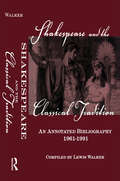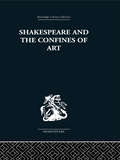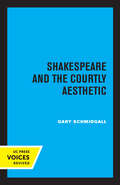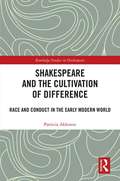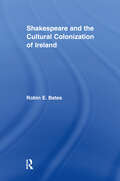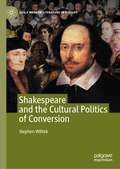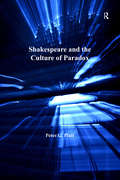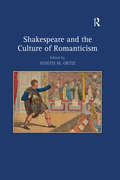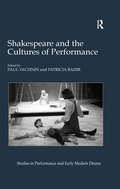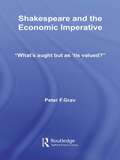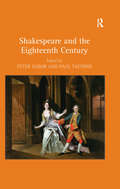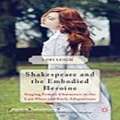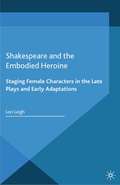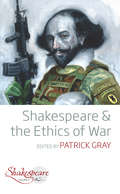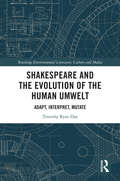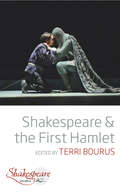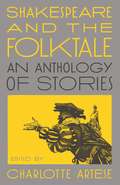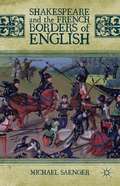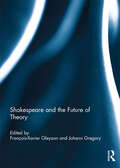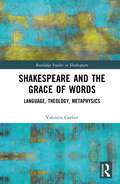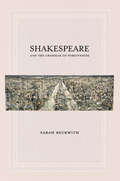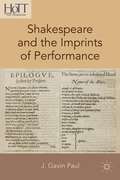- Table View
- List View
Shakespeare and the Classical Tradition: An Annotated Bibliography, 1961-1991 (Garland Reference Library Of The Humanities Ser.)
by Lewis WalkerThis bibliography will give comprehensive coverage to published commentary in English on Shakespeare and the Classical Tradition during the period from 1961-1985. Doctoral dissertations will also be included. Each entry will provide a clear and detailed summary of an item's contents. For pomes and plays based directly on classical sources like Antony and Cleopatra and The Rape of Lucrece, virtually all significant scholarly work during the period covered will be annotated. For other works such as Hamlet, any scholarship that deals with classical connotations will be annotated. Any other bibliographies used in the compiling of this volume will be described with emphasis on their value to a student of Shakespeare and the Classics.
Shakespeare and the Confines of Art
by Philip EdwardsFirst published in 1968. By selective study of certain of the comedies, tragedies and sonnets, Philip Edwards views Shakespeare's work as a whole and explains why his art developed as it did. The work which the author sees Shakespeare striving to create is the perfect fusion of comedy and tragedy and he suggests that we are watching the progress of a mind as acutely conscious as anyone today of the disorder and lack of meaning in the world. Nevertheless, it remains faithful to the possibility that within the imaginable forms of drama there exists that play which will satisfy the basic human need for reassurance, order and control.
Shakespeare and the Courtly Aesthetic
by Gary R. SchmidgallThis title is part of UC Press's Voices Revived program, which commemorates University of California Press’s mission to seek out and cultivate the brightest minds and give them voice, reach, and impact. Drawing on a backlist dating to 1893, Voices Revived makes high-quality, peer-reviewed scholarship accessible once again using print-on-demand technology. This title was originally published in 1981.
Shakespeare and the Cultivation of Difference: Race and Conduct in the Early Modern World (Routledge Studies in Shakespeare)
by Patricia AkhimieShakespeare and the Cultivation of Difference reveals the relationship between racial discrimination and the struggle for upward social mobility in the early modern world. Reading Shakespeare’s plays alongside contemporaneous conduct literature - how-to books on self-improvement - this book demonstrates the ways that the pursuit of personal improvement was accomplished by the simultaneous stigmatization of particular kinds of difference. The widespread belief that one could better, or cultivate, oneself through proper conduct was coupled with an equally widespread belief that certain markers (including but not limited to "blackness"), indicated an inability to conduct oneself properly, laying the foundation for what we now call "racism." A careful reading of Shakespeare’s plays reveals a recurring critique of the conduct system voiced, for example, by malcontents and social climbers like Iago and Caliban, and embodied in the struggles of earnest strivers like Othello, Bottom, Dromio of Ephesus, and Dromio of Syracuse, whose bodies are bruised, pinched, blackened, and otherwise indelibly marked as uncultivatable. By approaching race through the discourse of conduct, this volume not only exposes the epistemic violence toward stigmatized others that lies at the heart of self-cultivation, but also contributes to the broader definition of race that has emerged in recent studies of cross-cultural encounter, colonialism, and the global early modern world.
Shakespeare and the Cultural Colonization of Ireland (Literary Criticism and Cultural Theory)
by Robin BatesFocusing on plays (Richard II, Henry V, and Hamlet) which appear prominently in the writing of the Irish nationalist movement of the early twentieth century, this study explores how Irish writers such as Sean O’Casey, Samuel Beckett, W. B. Yeats, G. B. Shaw, James Joyce, and Seamus Heaney resisted English cultural colonization through a combination of reappropriation and critique of Shakespeare's work.
Shakespeare and the Cultural Politics of Conversion (Early Modern Literature in History)
by Stephen WittekThis book takes a close look at Shakespeare’s engagement with the flurry of controversy and activity surrounding the concept of conversion in post-Reformation England. For playhouse audiences during the period, conversional thought encompassed a markedly diverse, fluid amalgamation of ideas, practices, and arguments centered on the means by which an individual could move from one category of identity to another. In an analysis that includes chapter-length readings of The Taming of the Shrew, Henry IV Part I, The Merchant of Venice, Othello, and The Tempest, the book argues that Shakespearean drama made a unique and substantive intervention in public discourse surrounding conversion, and continues to speak meaningfully about conversional experience for audiences in the present age. It will be of particular benefit to students and scholars with an interest in theatrical history, performance theory, theology, cultural studies, race studies, and gender studies.
Shakespeare and the Culture of Paradox (Studies In Performance And Early Modern Drama Ser.)
by Peter G. PlattExploring Shakespeare's intellectual interest in placing both characters and audiences in a state of uncertainty, mystery, and doubt, this book interrogates the use of paradox in Shakespeare's plays and in performance. By adopting this discourse-one in which opposites can co-exist and perspectives can be altered, and one that asks accepted opinions, beliefs, and truths to be reconsidered-Shakespeare used paradox to question love, gender, knowledge, and truth from multiple perspectives. Committed to situating literature within the larger culture, Peter Platt begins by examining the Renaissance culture of paradox in both the classical and Christian traditions. He then looks at selected plays in terms of paradox, including the geographical site of Venice in Othello and The Merchant of Venice, and equity law in The Comedy of Errors, Merchant, and Measure for Measure. Platt also considers the paradoxes of theater and live performance that were central to Shakespearean drama, such as the duality of the player, the boy-actor and gender, and the play/audience relationship in the Henriad, Hamlet, As You Like It, Twelfth Night, Antony and Cleopatra, The Winter's Tale, and The Tempest. In showing that Shakespeare's plays create and are created by a culture of paradox, Platt offers an exciting and innovative investigation of Shakespeare's cognitive and affective power over his audience.
Shakespeare and the Culture of Romanticism
by Joseph M. OrtizThe idea of Shakespearean genius and sublimity is usually understood to be a product of the Romantic period, promulgated by poets such as Coleridge and Byron who promoted Shakespeare as the supreme example of literary genius and creative imagination. However, the picture looks very different when viewed from the perspective of the myriad theater directors, actors, poets, political philosophers, gallery owners, and other professionals in the nineteenth century who turned to Shakespeare to advance their own political, artistic, or commercial interests. Often, as in John Kemble’s staging of The Winter’s Tale at Drury Lane or John Boydell’s marketing of paintings in his Shakespeare Gallery, Shakespeare provided a literal platform on which both artists and entrepreneurs could strive to influence cultural tastes and points of view. At other times, Romantic writers found in Shakespeare’s works a set of rhetorical and theatrical tools through which to form their own public personae, both poetic and political. Women writers in particular often adapted Shakespeare to express their own political and social concerns. Taken together, all of these critical and aesthetic responses attest to the remarkable malleability of the Shakespearean corpus in the Romantic period. As the contributors show, Romantic writers of all persuasions”Whig and Tory, male and female, intellectual and commercial”found in Shakespeare a powerful medium through which to claim authority for their particular interests.
Shakespeare and the Cultures of Performance (Studies in Performance and Early Modern Drama)
by Paul YachninTheatrical performance, suggest the contributors to this volume, can be an unpredictable, individual experience as well as a communal, institutional or cultural event. The essays collected here use the tools of theatre history in their investigation into the phenomenology of the performance experience, yet they are also careful to consider the social, ideological and institutional contingencies that determine the production and reception of the living spectacle. Thus contributors combine a formalist interest in the affective and aesthetic dimensions of language and spectacle with an investment in the material cultures that both produced and received Shakespeare's plays. Six of the chapters focus on early modern cultures of performance, looking specifically at such topics as the performance of rusticity; the culture of credit; contract and performance; the cultivation of Englishness; religious ritual; and mourning and memory. Building upon and interrelating with the preceding essays, the last three chapters deal with Shakespeare and performance culture in modernity. They focus on themes including literary and theatrical performance anxiety; cultural iconicity; and the performance of Shakespearean lateness. This collection strives to bring better understanding to Shakespeare's imaginative investment in the relationship between theatrical production and the emotional, intellectual and cultural effects of performance broadly defined in social terms.
Shakespeare and the Digital World
by Christie Carson Peter KirwanDue to the unique cultural capital of his works, Shakespeare has long been the test subject for new methods and digital advances in arts scholarship. Shakespeare sits at the forefront of the digital humanities – in archiving, teaching, performance and editing – impacting on scholars, theatres and professional organisations alike. The pace at which new technologies have developed is unprecedented (and the pressure to keep up is only growing). This book offers seventeen new essays that assess the opportunities and pitfalls presented by the twenty-first century for the ongoing exploration of Shakespeare. Through contributions from a broad range of scholars and practitioners, including case studies from those working in the field, the collection engages with the impact of the digital revolution on Shakespeare studies. By assessing and mediating this sometimes controversial digital technology, the book is relevant to those interested in the digital humanities as well as to Shakespeare scholars and enthusiasts.
Shakespeare and the Economic Imperative: “What’s aught but as ‘tis valued?” (Studies in Major Literary Authors)
by Peter F. GravDespite the volume of work Shakespeare produced, surprisingly few of his plays directly concern money and the economic mindset. Shakespeare and the Economic Imperative examines the five plays that do address monetary issues (The Comedy of Errors, The Merry Wives of Windsor, The Merchant of Venice, Measure for Measure and Timon of Athens), plays in which Shakespeare’s view of how economic determinants shape interpersonal relationships progressively darkens. In short, what thematically starts out in farce ends in nihilistic tragedy. Working within the critical stream of new economic criticism, this book uses formal analysis to interrogate how words are used — how words and metaphoric patterns from the quantifiable dealings of commerce transform into signifiers of qualitative values and how the endemic employment of discursive tropes based on mercantile principles debases human relationships. This examination is complemented by historical socio-economic contextualization, as it seems evident that the societies depicted in these plays reflect the changing world in which Shakespeare lived and wrote.
Shakespeare and the Eighteenth Century
by Sabor PeterIn 1700, Shakespeare was viewed as one of the leading Renaissance playwrights, but not as supreme. By 1800, he was not only widely performed and read but celebrated as a universal genius and a national literary hero. What happened during the intervening years is the subject of this fascinating volume, which brings together Renaissance and eighteenth-century scholars who examine how Shakespeare gradually penetrated, and came to dominate, the culture and intellectual life of people in the English-speaking world. The contributors approach Shakespeare from a wide range of perspectives, to illuminate the way contemporary philosophy, science and medicine, textual practice, theatre studies, and literature both informed and were influenced by eighteenth-century interpretations of his works. Among the topics are Falstaff and eighteenth-century ideas of the sublime, David Garrick's 1756 adaptation of The Winter's Tale and its relationship to medical theories of femininity, the textual practices of George Steevens, Shakespeare's importance in furthering the careers of actors on the eighteenth-century stage, and the influence of Shakespeare on writers as diverse as Edmund Burke, Horace Walpole, and Ann Radcliff. Together, the essays paint a vivid picture of the relationship between eighteenth-century Shakespeare and ideas about shared nationhood, knowledge, morality, history, and the self.
Shakespeare and the Eighteenth-Century Novel
by Kate RumboldThe eighteenth century has long been acknowledged as a pivotal period in Shakespeare's reception, transforming a playwright requiring 'improvement' into a national poet whose every word was sacred. Scholars have examined the contribution of performances, adaptations, criticism and editing to this process of transformation, but the crucial role of fiction remains overlooked. Shakespeare and the Eighteenth-Century Novel reveals for the first time the prevalence, and the importance, of fictional characters' direct quotations from Shakespeare. Quoting characters ascribe emotional and moral authority to Shakespeare, redeploy his theatricality, and mock banal uses of his words; by shaping in this way what is considered valuable about Shakespeare, the novel accrues new cultural authority of its own. Shakespeare underwrites, and is underwritten by, the eighteenth-century novel, and this book reveals the lasting implications for both of their reputations.
Shakespeare and the Embodied Heroine
by Lori LeighShakespeare and the Embodied Heroine is a dynamic cross-period investigation of Shakespeare's notable female characters from the late plays. Using the Restoration and eighteenth century adaptations of Shakespeare's plays, this book explores female characters from a theatrical point-of-view that includes a close-reading and imagining of the text with a 'directorial eye', performance history, and practical staging experiments. Leigh reveals evidence to question certain conventional interpretations of Shakespeare's heroines and also documents a paradoxical reduction of sexuality and independent agency for Shakespeare's female roles as they started to be played by actresses rather than boy players. Highlighting the manner in which Shakespeare's female characters have the power to question, subvert, and reposition gender boundaries, and illuminating the complexity and multiplicity of the ways the women in Shakespeare's plays express their agency and desire, this book provides fascinating new readings on the staging and reception of Shakespeare's heroines.
Shakespeare and the Embodied Heroine: Staging Female Characters in the Late Plays and Early Adaptations (Palgrave Shakespeare Studies)
by L. LeighShakespeare and the Embodied Heroine is a bold new investigation of Shakespeare's female characters using the late plays and the early adaptations written and staged during the seventeenth and eighteenth century.
Shakespeare and the Ethics of War (Shakespeare & #5)
by Patrick GrayHow does Shakespeare represent war? This volume reviews scholarship to date on the question and introduces new perspectives, looking at contemporary conflict through the lens of the past. Through his haunting depiction of historical bloodshed, including the Trojan War, the fall of the Roman Republic, and the Wars of the Roses, Shakespeare illuminates more recent political violence, ranging from the British occupation of Ireland to the Spanish Civil War, the Balkans War, and the past several decades of U. S. military engagement in Iraq and Afghanistan. Can a war be just? What is the relation between the ruler and the ruled? What motivates ethnic violence? Shakespeare’s plays serve as the frame for careful explorations of perennial problems of human co-existence: the politics of honor, the ethics of diplomacy, the responsibility of non-combatants, and the tension between idealism and Realpolitik.
Shakespeare and the Evolution of the Human Umwelt: Adapt, Interpret, Mutate (Routledge Environmental Literature, Culture and Media)
by Timothy Ryan DayShakespeare and the Evolution of the Human Umwelt brings together research on Shakespeare, biosemiotics, ecocriticism, epigenetics and actor network theory as it explores the space between nature and narrative in an effort to understand how human bodies are stories told in the emergent language of evolution, and how those bodies became storytellers themselves. Chapters consider Shakespeare’s plays and contemporary works, such as those of Barbara Kingsolver and Margaret Atwood, or productions for which Shakespeare is a genetic forebear, as evolutionary artefacts which have helped to shape the human umwelt—the species-specific linguistic habitat that humans share in common. The work investigates the juncture where semisphere meets biosphere and illuminates the role that narrative plays in our construction of the world we occupy. The plays of Shakespeare, as works that have had unparalleled cultural diffusion, are uniquely situated to speak to the ways in which ideas and the texts they use as vehicles are always material, always environmental, and always alive. The book discusses Shakespeare’s works as vital nodes in our cultural, historical, moral and philosophical networks, but also as environmental actors in and of themselves. Plays are presented alternately as digitally encoded bits of culture awaiting their connection to an analog world, or as bacteria interacting with living organisms in both productive and destructive ways, altering their structure and creating new meaning through movement that is simultaneously biological and poetic. This book will be of great interest to students and scholars of ecocriticism looking to model ecocritical readings and bridge gaps between scientific, philosophical and literary thinking.
Shakespeare and the First Hamlet (Shakespeare & #9)
by Terri BourusThe first edition of Hamlet – often called ‘Q1’, shorthand for ‘first quarto’ – was published in 1603, in what we might regard as the early modern equivalent of a cheap paperback. Yet this early version of Shakespeare’s classic tragedy is becoming increasingly canonical, not because there is universal agreement about what it is or what it means, but because more and more Shakespearians agree that it is worth arguing about. The essays in this collected volume explore the ways in which we might approach Q1’s Hamlet, from performance to book history, from Shakespeare’s relationships with his contemporaries to the shape of his whole career.
Shakespeare and the Folktale: An Anthology of Stories
by Charlotte ArteseAn international collection of the traditional tales that inspired some of Shakespeare's greatest playsShakespeare knew a good story when he heard one, and he wasn't afraid to borrow from what he heard or read, especially traditional folktales. The Merchant of Venice, for example, draws from "A Pound of Flesh," while King Lear begins in the same way as "Love Like Salt," with a king asking his three daughters how much they love him, then banishing the youngest when her cryptic reply displeases him. This unique anthology presents more than forty versions of folktales related to eight Shakespeare plays: The Taming of the Shrew, The Comedy of Errors, Titus Andronicus, The Merchant of Venice, All's Well That Ends Well, King Lear, Cymbeline, and The Tempest. These fascinating and diverse tales come from Europe, the Middle East, India, the Caribbean, and South America, and include stories by Gerald of Wales, Marie-Catherine d'Aulnoy, Jacob and Wilhelm Grimm, Giambattista Basile, J. M. Synge, Zora Neale Hurston, Italo Calvino, and many more. Organized by play, each chapter includes a brief introduction discussing the intriguing connections between the play and the gathered folktales. Shakespeare and the Folktale can be read for the pure pleasure these lively tales give as much as for the insight into Shakespeare's plays they provide.
Shakespeare and the French Borders of English
by Michael SaengerThis study emerges from an interdisciplinary conversation about the theory of translation and the role of foreign language in fiction and society. By analyzing Shakespeare's treatment of France, Saenger interrogates the cognitive borders of England - a border that was more dependent on languages and ideas than it was on governments and shorelines.
Shakespeare and the Future of Theory
by François-Xavier Gleyzon and Johann GregoryShakespeare and the Future of Theory convenes internationally renowned Shakespeare scholars, and scholars of the Early Modern period, and presents, discusses, and evaluates the most recent research and information concerning the future of theory in relation to Shakespeare’s corpus. Original in its aim and scope, the book argues for the critical importance of thinking Shakespeare now, and provides extensive reflections and profound insights into the dialogues between Shakespeare and Theory. Contributions explore Shakespeare through the lens of design theory, queer theory, psychoanalysis, Derrida and Foucault, amongst others, and offer an innovative interdisciplinary analysis of Shakespeare’s work. This book was originally published as two special issues of English Studies.
Shakespeare and the Grace of Words: Language, Theology, Metaphysics (Routledge Studies in Shakespeare)
by Valentin GerlierCrossing the boundaries between literature, philosophy and theology, Shakespeare and the Grace of Words pioneers a reading strategy that approaches language as grounded in praise; that is, as affirmation and articulation of the goodness of Being. Offering a metaphysically astute theology of language grounded in the thought of Renaissance theologian Nicholas of Cusa, as well as readings of Shakespeare that instantiate and complement its approach, this book shows that language in which the divine gift of Being is received, apprehended and expressed, even amidst darkness and despair, is language that can renew our relationship with one another and with the things and beings of the world. Shakespeare and the Grace of Words aims to engage the reader in detailed, performative close readings while exploring the metaphysical and theological contours of Shakespeare’s art—as a venture into a poetic illumination of the deep grammar of the real.
Shakespeare and the Grammar of Forgiveness
by Sarah BeckwithShakespeare lived at a time when England was undergoing the revolution in ritual theory and practice we know as the English Reformation. With it came an unprecedented transformation in the language of religious life. Whereas priests had once acted as mediators between God and men through sacramental rites, Reformed theology declared the priesthood of all believers. What ensued was not the tidy replacement of one doctrine by another but a long and messy conversation about the conventions of religious life and practice. In this brilliant and strikingly original book, Sarah Beckwith traces the fortunes of this conversation in Shakespeare’s theater. Beckwith focuses on the sacrament of penance, which in the Middle Ages stood as the very basis of Christian community and human relations. With the elimination of this sacrament, the words of penance and repentance—"confess," "forgive," "absolve" —no longer meant (no longer could mean) what they once did. In tracing the changing speech patterns of confession and absolution, both in Shakespeare’s work and Elizabethan and Jacobean culture more broadly, Beckwith reveals Shakespeare’s profound understanding of the importance of language as the fragile basis of our relations with others. In particular, she shows that the post-tragic plays, especially Pericles, Cymbeline, The Winter’s Tale, and The Tempest, are explorations of the new regimes and communities of forgiveness. Drawing on the work of J. L. Austin, Ludwig Wittgenstein, and Stanley Cavell, Beckwith enables us to see these plays in an entirely new light, skillfully guiding us through some of the deepest questions that Shakespeare poses to his audiences.
Shakespeare and the Idea of Apocrypha
by Peter KirwanIn addition to the thirty-six plays of the First Folio, some eighty plays have been attributed in whole or part to William Shakespeare, yet most are rarely read, performed or discussed. This book, the first to confront the implications of the 'Shakespeare Apocrypha', asks how and why these plays have historically been excluded from the canon. Innovatively combining approaches from book history, theatre history, attribution studies and canon theory, Peter Kirwan unveils the historical assumptions and principles that shaped the construction of the Shakespeare canon. Case studies treat plays such as Sir Thomas More, Edward III, Arden of Faversham, Mucedorus, Double Falsehood and A Yorkshire Tragedy, showing how the plays' contested 'Shakespearean' status has shaped their fortunes. Kirwan's book rethinks the impact of authorial canons on the treatment of anonymous and disputed plays.
Shakespeare and the Imprints of Performance (History Of Text Technologies)
by J. Gavin PaulShakespeare and the Imprints of Performance.
